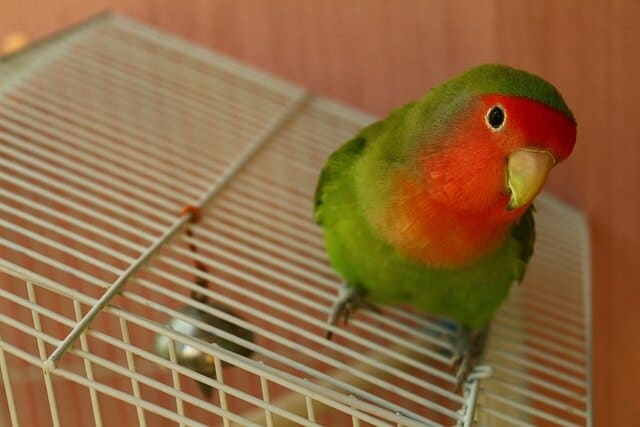After a long, exhausting day of work, the last thing you want to do is come home to your lovebird screaming loud enough for the whole neighborhood to hear. So why do they do it, and how do we get them to be even just a little bit quieter?
Your sweet but noisy lovebird could simply be bored and just trying to have some fun! However, there are more complex reasons a lovebird might scream, like stress, injury or illness, fear, lack of sleep, and even changes in the family dynamic.
Only when we understand why our lovebirds scream can we finally figure out the best way to get them to use their inside voices!
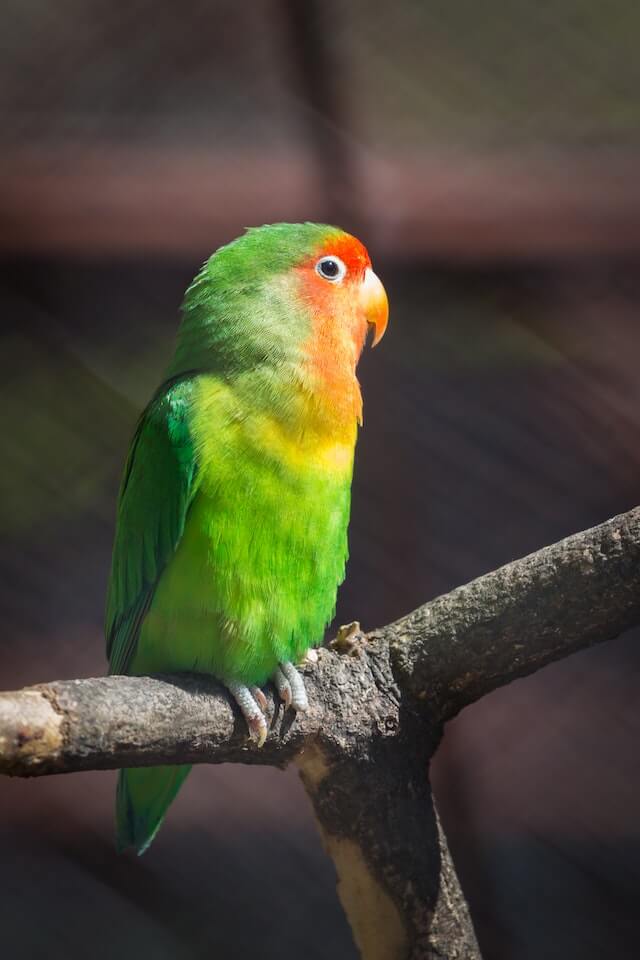
Why Do Lovebirds Scream? 6 Possible Reasons
1. Boredom
One of the simplest explanations for why lovebirds scream is just that they are bored. Their screams aren’t usually long-winded; instead, they are more like a series of awful, ear-piercing repetitive chirps. They may be telling us that they need some companionship or some play time!
To understand lovebirds’ body language, we highly recommend watching this informative video:
2. Injury or illness
Lovebirds might scream because of more serious circumstances like injury and feeling unwell. If your lovebird is suddenly screaming uncharacteristically, be sure to take it to the vet for a work-up to ensure everything is okay.
3. Jealousy
Lovebirds are also known for having a bit of a jealous tendency. If they feel that they aren’t getting enough of your time and attention or someone else (whether it be another bird or a human) is getting more attention, they may get upset and scream to let you know about their dissatisfaction.
4. Stress
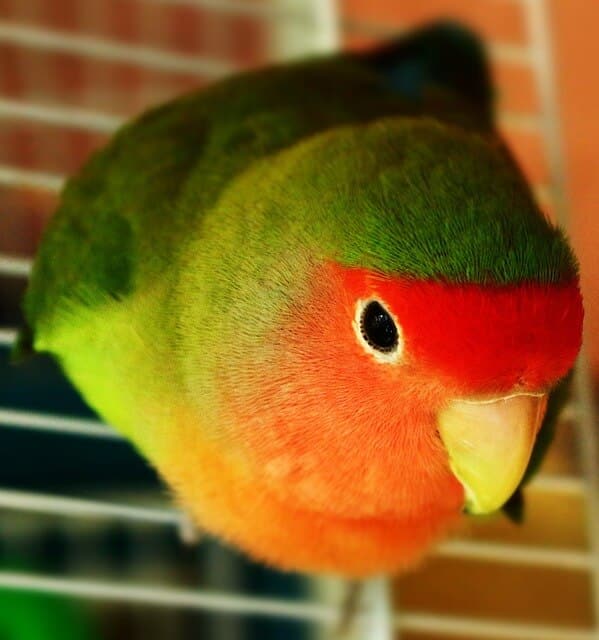
Stress and anxiety can also be a cause for lovebirds to scream. They might feel stressed because of their habitat being moved to a new room or even just freshly cleaned. They can be quite particular! Or they could be experiencing stress and anxiety due to a change in the family dynamic, like the addition of a new roommate or child. Even moving to a new home could cause a lot of stress for a bird.
5. Fear
Fear is also something that will make a lovebird scream. In the wild, birds constantly make noise and communicate, but when there is impending danger, they know to get much louder to warn their feathery friends. Your lovebird could be afraid of your dog or cat and be trying to raise the alarm.
6. Lack of sleep
Much like humans, lovebirds can get cranky if they don’t get enough sleep! A cranky lovebird is usually a loud lovebird! Consider whether your lovebird is getting enough quiet time away from bright lights, loud noises, and other stimulants to ensure he is getting enough sleep.
How To Stop Lovebirds From Screaming
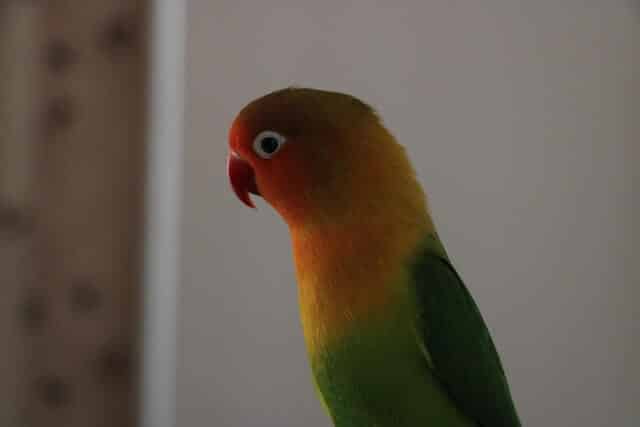
1. Don’t Reward Bad Behavior
Make sure you don’t reward your lovebird’s behavior. You may think you aren’t rewarding your lovebird’s behavior just by scolding him or looking in his direction.
Unfortunately, if you pay attention to your bird after he screams, the bird will, over time, start to associate his loud screaming with you giving him attention.
Even just by looking in his direction or scolding him by name, your bird could be associating screaming with your attention.
In fact, if your bird starts to scream unnecessarily (without provocation), don’t even make eye contact with the bird, let alone speak to him or engage with him. Better yet, leave the room entirely. This can be a tiresome learning period as your bird will be upset and may scream more or louder when it realizes you are ignoring it.
However, most people find that eventually, the bird will learn that the screaming will always result in your absence and not a reward.
For social creatures like lovebirds, your being absent will not be pleasing to them. Don’t leave the room for too long, though. We don’t want to punish the bird with our absence, but simply send a message that screaming won’t get you to come closer.
Don’t scream back, rattle the cage, act loudly, or show your bird your frustration. This will frighten the bird, resulting in a damaged relationship between you and your bird, or it will only encourage the bird to scream louder!
2. Use Positive Reinforcement
Use positive reinforcement to reward the behaviors you want to see.

For example, quietly climbing around on its perch or quietly sitting are desirable behaviors.
Offer your bird a bite of his favorite snack when he is doing these activities. Over time, they’ll learn to associate their reward with the desired behavior.
Don’t use food or rewards as a bribe to get the bird to stop screaming, though! This will only further engrain the behavior in the bird’s mind.
They’ll think, “Oh if I scream, my person comes over and gives me a treat! I should do this more often!” or something along those lines!
3. Keep Your Bird Busy
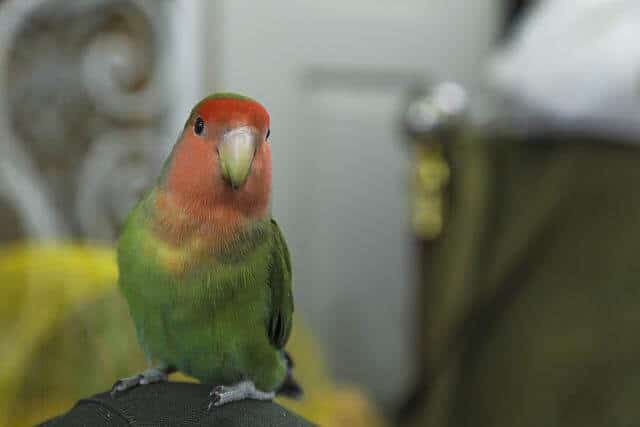
Provide your bird with more companionship and activity. Maybe he needs another bird friend, or maybe he just needs someone to interact with him a little bit more throughout the day.
Even if you can’t dedicate tons of face time with your bird, provide plenty of games, and exercise, so he doesn’t get bored – Consider getting foraging toys, so your bird is encouraged to work for his food and explore using all his senses to find his food.
Increasing mental stimulation and physical activity will make a much happier bird.
Related Read: Can Birds Smile? Explained!
Prevention
There are things you can do to prevent your bird from feeling the need to scream as much. One example is just providing a place where they feel safe and stress-free.
Regular veterinary visits to ensure its good health is another option. Avoid responding to screams, but do try your best to respond to your bird when it calls to you more nicely or quietly.
Birds are sociable creatures, and just like us, they use their voices to communicate with their family. If your bird knows that you will come if it just gives a little chirp, it may never feel the need to scream for your attention.
Conclusion
While it may not be possible to entirely stop a lovebird from screaming (they are vocal and social creatures, after all!), there are still quite a few things you can do to both prevent screaming and reduce the frequency at which it happens.
To prevent and reduce the chances of a lovebird screaming, ensure that they have plenty of activities and are set up in a safe and stress-free environment.
To stop a lovebird from screaming, first rule out any underlying health conditions. Then use positive reinforcement to train your bird not to scream, avoid getting loud with your bird, and instead keep calm and talk quietly.
It may take some time, but don’t lose hope! With time, you’ll have a perfectly lovely lovebird.

